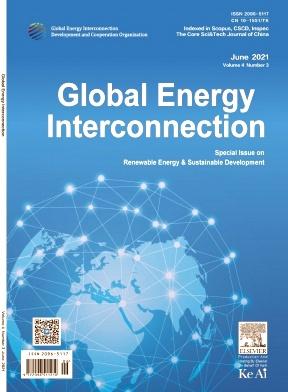新型电力系统下离网微电网储能与可再生能源协同优化研究
IF 1.9
Q4 ENERGY & FUELS
引用次数: 0
摘要
由于全球能源格局的关键转变,向偏远地区供电是一项重大挑战。为了解决这一问题,本研究提出了一种与储能系统集成的离网微电网解决方案。离网微电网是一种自给自足的电网,能够通过向当地居民提供稳定可靠的电力,有效解决偏远地区的电力接入问题。本文以国内外研究为基础,对离网微电网的设计、控制策略、能源管理和优化进行了综述。它还探讨了储能系统在提高微电网稳定性和经济效率方面的关键作用。此外,还对离网储能系统的容量配置进行了分析。储能系统不仅可以缓解可再生能源发电的间歇性和波动性,还可以在需求高峰期提供电力支持,从而提高电网的稳定性和可靠性。通过对锂离子电池、抽水蓄能、压缩空气储能等不同储能技术的对比,提出了适合不同应用场景的最佳储能容量配置方案。最后,以某典型微网为例,对离网微网与储能一体化进行了实证分析。确定了储能系统的最优配置,探讨了不同场景下风电与太阳能并网对电网平衡的影响。研究发现,合理配置储能系统可以显著提高可再生能源利用率,降低系统运行成本,增强电网在极端条件下的弹性。本研究为偏远地区离网微电网的设计与实现提供了必要的理论支持和实践指导。本文章由计算机程序翻译,如有差异,请以英文原文为准。
Research on the coordinated optimization of energy storage and renewable energy in off-grid microgrids under new electric power systems
The supply of electricity to remote regions is a significant challenge owing to the pivotal transition in the global energy landscape. To address this issue, an off-grid microgrid solution integrated with energy storage systems is proposed in this study. Off-grid microgrids are self-sufficient electrical networks that are capable of effectively resolving electricity access problems in remote areas by providing stable and reliable power to local residents. A comprehensive review of the design, control strategies, energy management, and optimization of off-grid microgrids based on domestic and international research is presented in this study. It also explores the critical role of energy storage systems in enhancing microgrid stability and economic efficiency. Additionally, the capacity configurations of energy storage systems within off-grid networks are analyzed. Energy storage systems not only mitigate the intermittency and volatility of renewable energy generation but also supply power support during peak demand periods, thereby improving grid stability and reliability. By comparing different energy storage technologies, such as lithium-ion batteries, pumped hydro storage, and compressed air energy storage, the optimal energy storage capacity configurations tailored to various application scenarios are proposed in this study. Finally, using a typical microgrid as a case study, an empirical analysis of off-grid microgrids and energy storage integration has been conducted. The optimal configuration of energy storage systems is determined, and the impact of wind and solar power integration under various scenarios on grid balance is explored. It has been found that a rational configuration of energy storage systems can significantly enhance the utilization rate of renewable energy, reduce system operating costs, and strengthen grid resilience under extreme conditions. This study provides essential theoretical support and practical guidance for the design and implementation of off-grid microgrids in remote areas.
求助全文
通过发布文献求助,成功后即可免费获取论文全文。
去求助
来源期刊

Global Energy Interconnection
Engineering-Automotive Engineering
CiteScore
5.70
自引率
0.00%
发文量
985
审稿时长
15 weeks
 求助内容:
求助内容: 应助结果提醒方式:
应助结果提醒方式:


